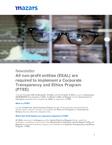
All non-profit entities (ESAL) are required to implement a Corporate Transparency and Ethics Program (PTEE)
What is a PTEE?
It is the Compliance and Procedures Policy through which guidelines are established to identify, detect, prevent, manage, and mitigate the Risks of Corruption or Transnational Bribery that may affect the obligated entity.
Which Non-Profit Entities are required to implement a PTEE?
All ESAL domiciled in Antioquia and the Capital District of Bogota that are under the inspection, surveillance, and control of the Department of Antioquia and the Mayor's Office of Bogotá are required to develop, present, and implement a Corporate Transparency and Ethics Program - PTEE.
Let's remember that Law 2195 of 2022 instructed the authorities exercising inspection, surveillance, and control functions over Non-Profit Entities to define the specific conditions that their supervised entities must consider carrying out the due diligence process. Therefore, it is expected that the obligation to implement a PTEE will extend to ESAL domiciled in all departments of the country.
What documents and actions does a Non-Profit Entity require to fulfill the obligation of implementing a PTEE?
- The mandatory documents and actions vary according to the assets of the ESAL; some deliverables are described below:
- The compliance policy.
- A risk matrix incorporating the identification and evaluation of detected risks of corruption and transnational bribery and the controls to be implemented.
- A protocol including rules for the delivery and offering of gifts or benefits to third parties, political contributions of any nature made with ESAL resources, among others.
- General policies and procedures for managing C/ST risk.
- Due diligence mechanisms to verify the origin of donor or cooperating resources, whether regular or occasional.
- Definition and socialization of a channel to allow anyone to report, confidentially and securely, suspicious activities related to the risk of C/ST.
- Establish mechanisms for the disclosure and monitoring of the program.
The program must be subscribed by the legal representative and submitted to the entity exercising inspection, surveillance, and control accompanied by a copy of the approval minutes; such approval must be issued by the highest body of the entity in the case of Antioquia; it may also be approved by the Board of Directors of ESAL domiciled in the Capital District of Bogota.
What are the deadlines for sending the PTEE to the Government of Antioquia and the Mayor's Office of Bogota?
ESAL domiciled in the department of Antioquia have until August 1 2024, to send the approved PTEE to the Government approved by the highest social body.
ESAL domiciled in the Capital District of Bogota must send their PTEE to the Mayor's Office of Bogota, according to the following schedule:
| Last two digits of the NIT without verification number | Maximum deadline for submitting legal and financial information |
| 01-20 | 1st week of May |
| 21-40 | 2nd week of May |
| 41-60 | 3rd week of May |
| 61-80 | 3rd week of May |
| 81-00 | Last week of May (or first week of June) |
What types of PTEE have been regulated?
There are 2 different types of programs depending on the asset value of the ESAL:
- Comprehensive Corporate Transparency and Ethics Program (PTEE-I): For ESAL whose total assets as of December 31 2023, are equal to or greater than one thousand (1,000) legal monthly minimum wages.
- Simplified Corporate Transparency and Ethics Program (PTEE-S): For ESAL whose total assets as of December 31 2023, are less than one thousand (1,000) legal monthly minimum wages.
What sanctions can be imposed for not implementing a PTEE?
ESAL domiciled in the Department of Antioquia and the Capital District of Bogota that do not implement their PTEE within the established deadlines may incur, among others, the following sanctions by the supervisory entity:
- Suspension and cancellation of legal personality.
- Cancellation of the registration of dignitaries or the legal representative.
- Imposition of fines up to 100 SMLMV in case of not providing the information requested during the administrative investigation.
The foregoing, without prejudice to the applicable sanctions when ESAL engage in acts of corruption or transnational bribery, which can reach 2,000 SMLMV in accordance with Law 2195 of 2022.
Can we help you?
At Mazars we have professionals specialized in complying with each of these obligations, whom we make available to you. If you require support in the implementation or compliance with the obligations contained in this newsletter, please contact us, and we will gladly analyze the best way to support you in your compliance.


